— Sad to see Son Heung-min leave Tottenham this summer. He’s an incredible footballer, his Puskas Award winning goal against Burnley proves it.
Posts about Football (RSS, JSON)
— ChatGPT running hot tonight as scores of Gooners scramble to come up with new jokes.
Melbourne Victory vs. Melbourne City 1:1 (0:1)
— Who would have thought. An entertaining game of football in front of a big, raucous crowd on Australian soil. It was a pulsating match between the two Melbourne clubs, chances on both sides, more on Victory’s side; both teams equally wasteful in front of the goal, Victory almost comically bad at times.
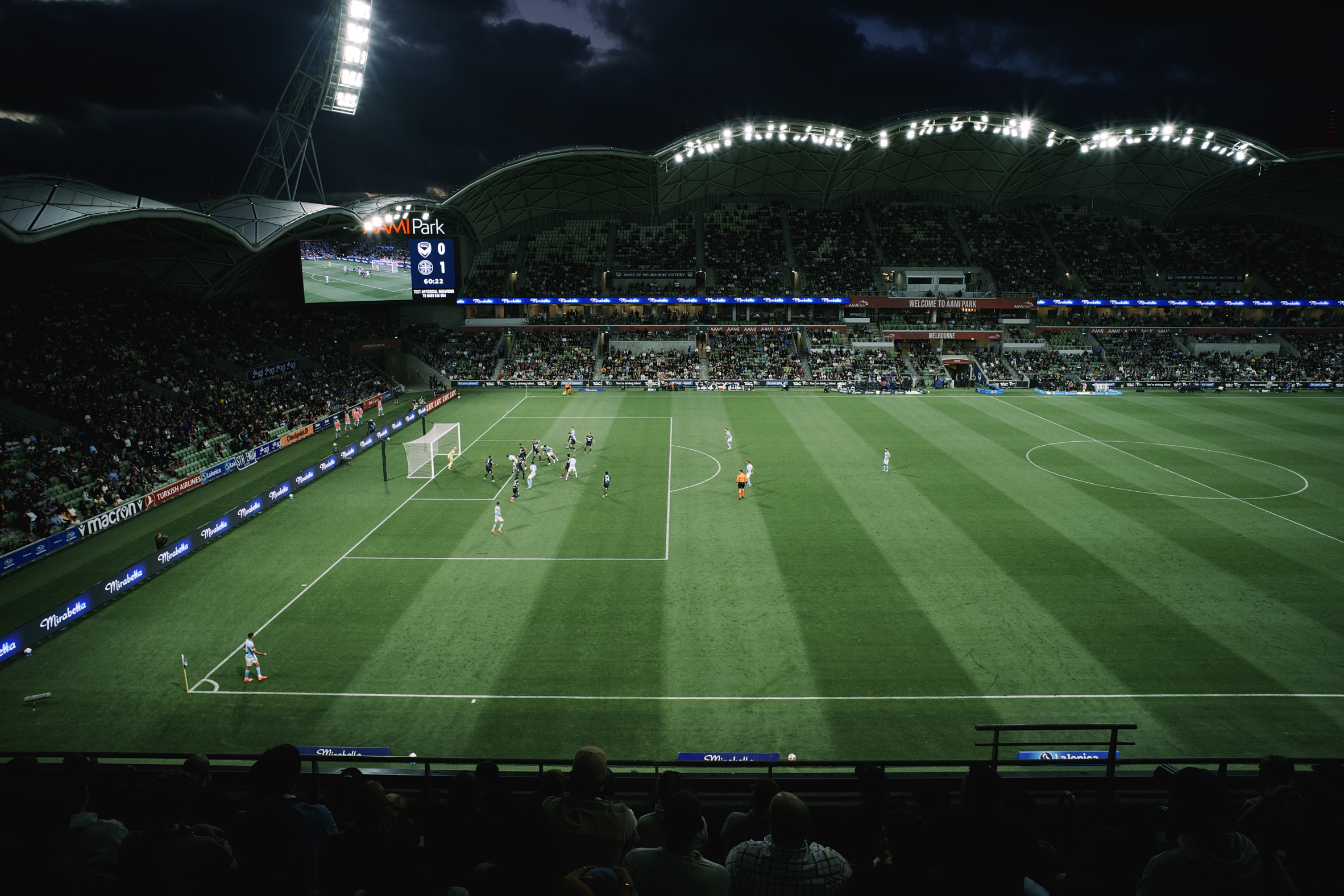
City had the better start, playing the better, more direct football and deservedly scoring early in the game. Victory grew more confident with every passing minute but lacking the conviction for the final pass. It took until deep into the second half for them to create real chances and a commotion after a corner to equalise.
A-League. AAMI Park, 21 December 2024 7:35. Attendance: 24,053. Goals: 0:1 Yonatan Cohen (16’), 1:1 Roderick Miranda (65’).
— The groups for the new-format 2025 Club World Cup were drawn this week and we’re in for a couple of absolute treats:
- Al Ahly vs Inter Miami
- Wydad AC vs Al Ain
- Ulsan HD vs Mamelodi Sundowns
- Al Hilal vs Pachuca
I’m sure these games will be instant classics.
OmegaBall
— Travelling the US is always an enriching experience. You get to enjoy Hotel TV showing programs like ESPN’s The Ocho, where they feature obscure emerging sports like OmegaBall.
OmegaBall is a version of football. OmegaBall inventor Anthony Dittmann says he came up with the idea because he didn’t like the slow speed of regular football and he “despises” the offside rule. So the obvious conclusion is not to start a 5-aside league or to watch Futsal instead. No, a new form must be invented that is played on a circular pitch, with three teams versing each other instead of two.
Always stay weird America!
Melbourne City vs. Sydney FC 2:0 (1:0)
— Both sides didn’t have the best start to the season, losing their first two games. Somewhat surprising then, the quality of this match was much better than the previous ones I’ve attended on Australian soil. Both teams created plenty of chances, playing with pace and precision. Still, this isn’t the Premier League, but it’s a start.
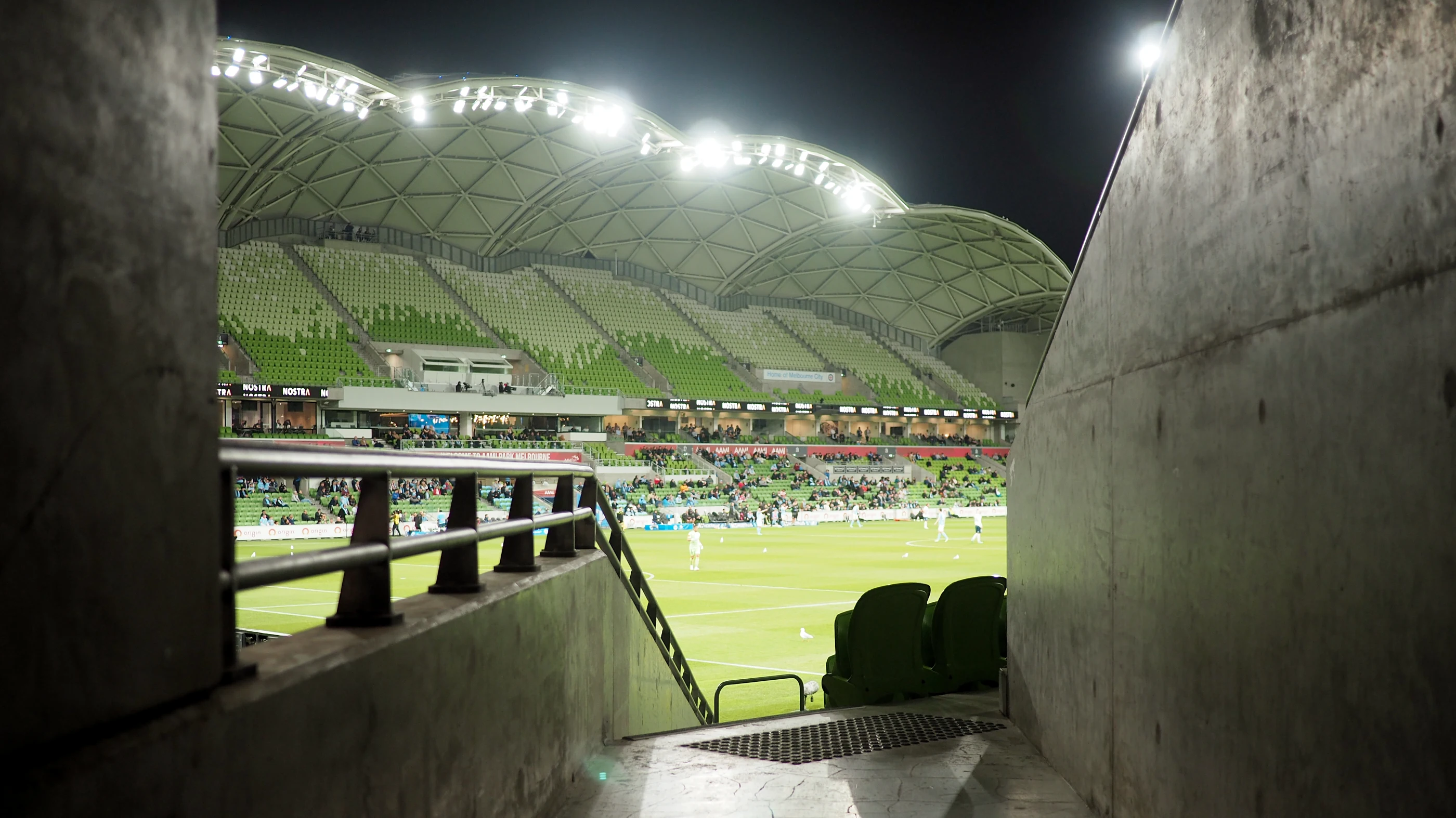
It was Melbourne City who were in control most of the game, pushing Sydney into their own half and putting pressure on the goal. Sydney FC had chances to take the lead in the opening minutes, to get one back after going down 2:0 or even equalise late in the game. But their lack of composure and precision in front of the goal were astonishing. As these things go in football, City scored late in the first half and early in the second, and that was that.
The attendance was disappointing. Just over 5,000 people saw the game. I’ve been to Division 4 games in Germany that attracted a bigger audience.
A-League. AAMI Park, 04 November 2023 7:45. Attendance: 5,303. Goals: 1:0 Steven Ugarković (45’), 2:0 Jamie Maclaren (46’).
— Every week, former professional football players meet to kick a ball about on an unassuming astro-turf pitch. Talk about love for the game.
Why Do All East-German Football Crests Look Similar?
— After linking to a list of East-German football logos, I went to find the crest of the club I played for in the late 1980s as an eight year old. Of course I found it; thank you, internet.

Many East-German football logos have a similar visual language. Vibrant, contrasting colours, hand-lettering, minimalist designs. The predominant visual style of the 1950s and 1960s.
A theory why this style is so common: After the end of World War II and the founding of the GDR, all existing sports clubs were dissolved and re-established. Teams were assigned to a state-owned industrial factory or workshop to bring them under the control of the new socialist regime and to rid them of fascist thinking. And so these new clubs needed new logos. Since the clubs were established around the same time, the new crests were too, in the 1950s and 1960s. Today they represent the zeitgeist of a specific time.
And just like these beautiful crests appeared at the same time, they all disappeared in the early nineties after Germany’s reunification, when the club’s names and associations changed again to rid them of any communist influence.
— German football magazine 11Freunde has collected crests from former East-German football clubs. Outstanding minimalist design.
Super League: The War for Football
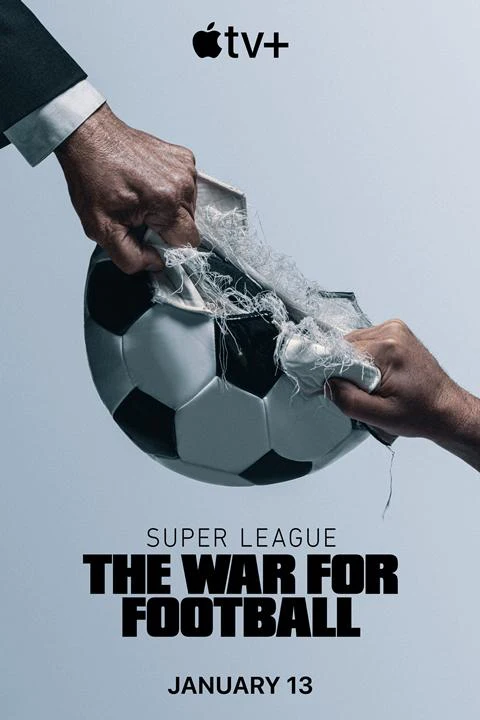
— Let’s not pretend the idea isn’t appealing: A league with the best clubs from Europe, the best players constantly facing each other, banging fixtures every week. I’ve created plenty such tournaments on FIFA. But the idea is best left in the virtual world on a Playstation. In reality, such a construct would have wide-ranging consequences on football, further accumulating wealth with a few big clubs, leaving smaller teams struggling for financial survival.
There’s one thing this documentary makes abundantly clear: Not one of the men running football at the highest levels is in it for the love of the game but out of pure self interest.
Andrea Agnelli puts in succinctly:
It’s a business proposal. We’re not in it because we’re emotionally involved. We’re involved because we believe we can improve the system.
The driving forces behind the league, Andrea Agnelli of Juventus, Joan Laporta of FC Barcelona, and Florentino Pérez of Real Madrid, they all lead football clubs, which struggle financially, so obviously they favour a guaranteed yearly income.
Gianni Infantino tells people what they want to hear. He wants more influence on club football but more importably he wants to stay in the top position in FIFA. He needs the support from UEFA members so he’s against the league. Nasser Al-Khelaifi saw an opportunity to widen his influence across European football by aligning with Čeferin and becoming chairman of the European Club Association (ECA). Aleksander Čeferin was against super league to save his position. If there was a way to extract more money from the fans without upsetting them he’ll support it. His half-hearted approach towards financial fair play in European football says it all. If he was serious about protecting small clubs, he’d have to confront his new ally Nasser Al-Khelaifi and put screws on how much PSG can spend.
And Boris Johnson found a welcome distraction from the political pressure he faced at the time after repeatedly making bad decisions.
The documentary series gives room to different views and opinions, moreover it show football is in very bad hands. Super League may not have happened this time, but it may well happen in five or ten years.
Creators: Connor Schell, Jeff Zimbalist.
Unprecedented Exposure
— Messi officially joins Inter Miami and the US American press is going into hyperbole mode:
The signing is reminiscent of 2007, when Los Angeles Galaxy of M.L.S. signed the world’s most famous player, if not the best, David Beckham, at age 32. Beckham played in L.A. for six years, winning two championships, and brought the league unprecedented exposure.
I remember that Beckham played for LA Galaxy but I didn’t know he won two championships. This was at a time when I would watch any football game, anywhere, anytime. I had a season ticket so I don’t miss a single home of my local tier-three team. I went to see games of the U17 EUROs in 2009. If there was a Division 5 play-off match broadcast by a local TV station, I’d watch it. But I didn’t follow the MLS. Even today, most football fans outside the US would be hard pressed to name one team that won a MLS championship in the last five years. Do they call them World Champions too?
Coverage in European outlets has died down already. Messi joining Miami will make a difference on Messi’s bank account and the follower count of Inter Miami’s Instagram. But the MLS continues to be an inferior league that is irrelevant on a global scale—with or without Messi. People don’t care about US football because the game is better at home, and there’s already enough football to watch.
Unprecedented exposure? I know that Messi now wears pink when he plays.
— The New York Times disbands its Sports desk. Going forward, sports content will be supplied by their subsidiary The Athletic. The Times employs some of the finest sports journalists, Rory Smith amongst them. I hope they keep him around and let him continue do his thing, Smith’s football writing is one of the few reasons I subscribe to The Times.
Follow the Money
— Christiano Ronaldo joined Al-Nassr FC after his disgraceful exit from Manchester United in December, reportedly making about 215 million US dollar. Per year. Last week Karim Benzema followed Ronaldo to Saudi Arabia, joining Al-Ittihad for about 107 million US dollar. Per year. Saudi Arabia’s rulers parked the money truck outside these player’s homes to win them over with significant contributions to their retirement fund. And Lionel Messi at least considered a move to Saudi Arabia before he decided to join the football powerhouse Inter Miami.
Football players signing one last big contract at the end of their career isn’t a new thing. In the past, they would join a club in their home country, maybe even their childhood club. Maybe they’d go for a last adventure and play away from home for two years. Today, it seems, ageing stars pick the obscurest leagues to ease themselves into retirement. The US was always a destination big names towards the end of their career. Remember Pele and Beckenbauer, Beckham and Henry? For a couple of years it was China. Now it’s Saudi Arabia.
There are different reasons why humans change their jobs. Sometimes they don’t get along with colleagues or their manager. Sometimes they are looking for a new challenge. Ronaldo has won league titles in Portugal, England, Spain and Italy; he won the Champions League five times and the EURO in 2016. Benzema won the French and Spanish league several times and is a five-time Champions league winner. Messi won the league in Spain and France, the Champions League four times, the Copa América and the World Cup. I left out domestic and international cup trophies for each of them because there are too many to count. All of these players have won everything. As a young boy you dream of lifting one of these trophies once. They did it repeatedly. They have nothing more to prove. Not to themselves. Not to anyone else. I find it hard to believe that the Saudi Pro League or the MLS are appropriate challenges for players of this caliber. It might add another trophy or two to these already ridiculously long lists of silverware, but for the perception of these players it will do nothing. These leagues are far too inferior and are off people’s radar in most parts of the world.
There are different reasons why humans decide to work and live in another country. Sometimes they move for economic reasons or because they are being harassed because of their religion or sexuality; hoping to to live a better life in a different place. This is a valid reason for much of the world’s population but not for insanely rich top-tier football players. Sometimes humans move because they want to live in a different country, meet new people and experience a different culture. That, too, is a valid reason for many. I’ve lived amongst expats for years, people who “love to travel;” these people want to live in places like the US, Canada, Australia, South America, maybe south-east Asia. But nobody ever said “I’m dying to live in Saudi Arabia.” I find it hard to believe that Ronaldo and Benzema moved to Saudi Arabia for the cultural experience.
Andrew Das and Rory Smith argue that Messi made his choice with an eye on the next World Cup:
But a base in the United States would also have appealed to him for competitive reasons, potentially making it easier for Messi as he prepares to help Argentina defend its World Cup title in 2026.
Wouldn’t Argentina be the more obvious choice for this, let alone the more honest, gosh, more romantic option? Imagine he’d go back to where it all started?
The money seems like an odd motivation for someone who already has so much that their children won’t ever have to work. I mean real work, not running a charity or something. But the money seems to be the driving force behind these moves. After years at the top of the game, Ronaldo, Benzema, and Messi (and others) no longer play for the love of the game. They play for the money, the fame, and Instagram followers. It’s sad, but it perfectly fits in a world where World Cups are not tournaments anymore; they are events that FIFA milks to enrich their leadership. Clubs are now enterprises that have a brand strategy for China but little relation to the neighbourhoods where they originated from. These players are a product of their environment.
— Zlatan Ibrahimović retires from professional football. To commemorate the occasion, here’s my favourite quote:
Arsene Wenger asked me to have a trial with Arsenal when I was 17. I turned it down. Zlatan doesn’t do auditions.
Doesn’t get more Zlatan than this.
Australia vs. Ecuador 1:2 (1:0)
— This was one of the strangest games of football I’ve seen. The game wasn’t great, but it wasn’t bad either. Australia scored early and then focussed on defending. Ecuador was the better team, with better individual players; they created many chances and either missed the goal or were denied by Gauci, Australia’s promising keeper.
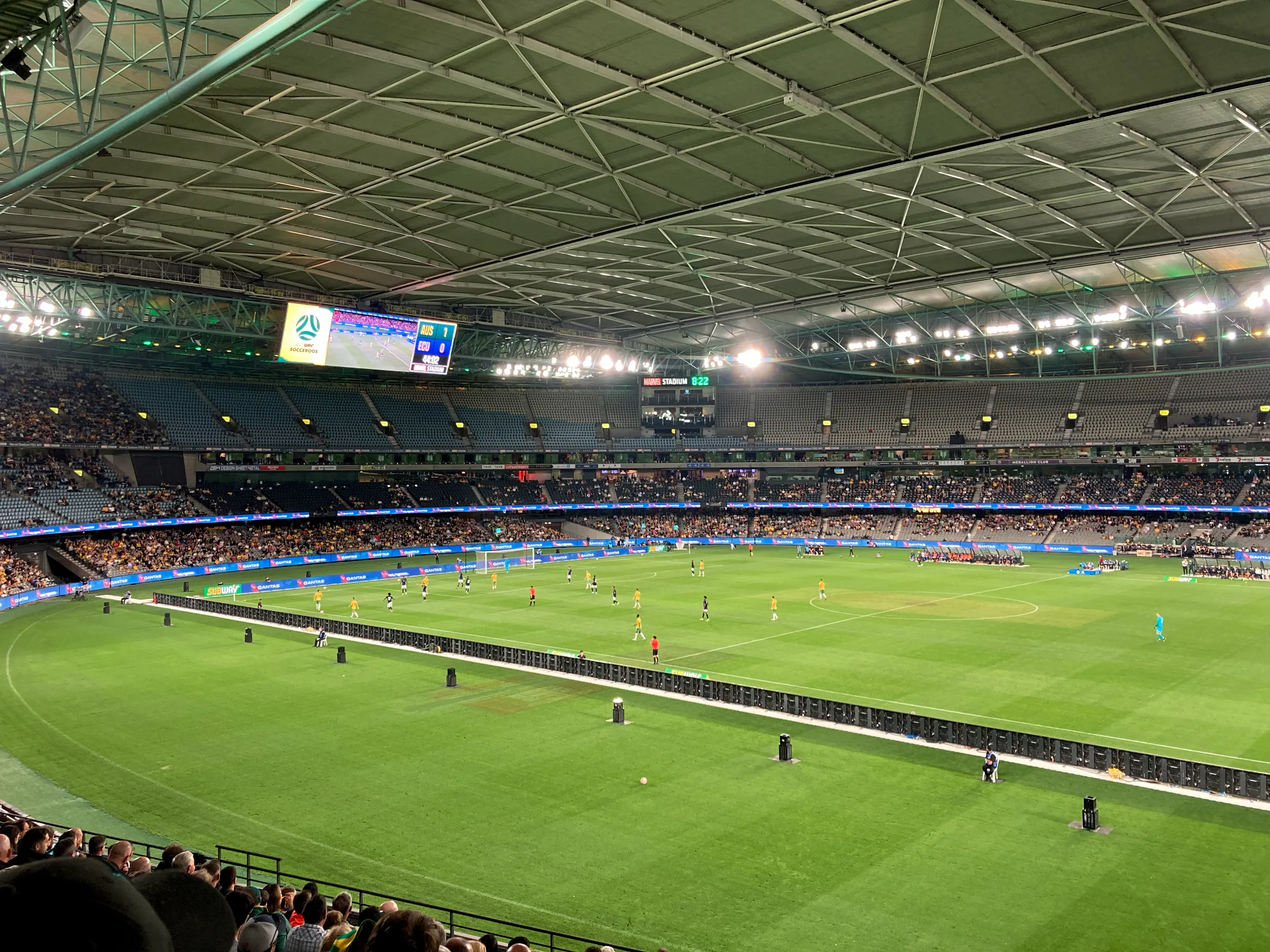
The game took place at Melbourne’s Marvel Stadium, a modern and soul-less arena built primarily for Cricket and AFL games. A football pitch is much smaller than one for Cricket, so anywhere in the stadium, you’re at least 30 meters away from the action. The stadium was only half full and the roof was closed to reduce noise outside the ground. It felt like you’re sitting in the main hall of a big convention centre on a Friday of a big conference when half of the attendees are already on their way home. The atmosphere was eerie, disconnected from the game; most people were chatting to their friends instead of watching.
International Friendly. Marvel Stadium, 28 March 2023 7:30. Attendance: 27,103. Goals: 1-0 Brandon Borrello (16’), 1-1 Pervis Estupiñán (51’, P), 1-2 William Pacho (64’).
The Keeper
— Bert Trautmann came to England as a prisoner of war after World War II. After his release, he got signed by Manchester City in 1949, where he went on to play more than 500 matches. He won the FA Cup with City in 1956 after breaking his neck and continuing to play for another 15 minutes until the final whistle.
The Keeper doesn’t do this incredible story justice, and it can’t. The movie focuses a lot on overcoming resistance to his background in the German Army, on and off the pitch, and personal setbacks. As a football follower and former goalkeeper, I would have loved to see how his many performances on the pitch shaped his image amongst the English people, which would be far easier in a documentary.
The Keeper (2019). Director: Marcus H. Rosenmüller. Cast: David Kross, Freya Mavor, John Henshaw.
— Pelé, one of the greatest footballers to ever play the game, has died aged 82.
He had become such a hero that, in 1961, to ward off European teams eager to buy his contract rights, the Brazilian government passed a resolution declaring him a nonexportable national treasure.
Imagine Messi or Ronaldo being forced to spend the prime of their career in the far inferior Argentinian or Portuguese football leagues. Would they be as good and as popular as they are today?
— Of the New York Times list of football movies, I have only seen The Cup, which was great.
Certainly missing from this list is Zidane: A 21st Century Portrait, a documentary that focusses only on Zinedine Zidane during a league match in 2005. You only see Zidane, never any other players. Closeups of his face, how focussed he is; his feet, you see how he moves, how elegantly he handles the ball. Truly beautiful.
On Football TV Coverage
— Football coverage in Germany is terrible. No matter what broadcasting network, they always seem to find men who have never played or even watched a game of football and hand them a microphone to enlighten viewers with their pathetic lack of understanding of the game and their questionable interpretation of the game’s rules. The “unnatural position of hands” to decide handball or not, that was German commentators who started it ten years ago. You are very welcome, world. It was so bad we sometimes turned off the TV’s sound and played radio commentary instead. And people welcomed alternative online streams that networks introduced, which didn’t have commentary at all.
I didn’t think you could do any worse, but as it turns out, you can.
— The world-class New York Times graphics department designed charts depicting the scenarios under which each team will advance to the knock-out stage of the Football World Cup.
— Cennydd Bowles argues that it’s ok, ethically speaking, to watch the Football World Cup.
I have watched fewer and fewer games of big football tournaments in recent years. I no longer have time to sit around and watch football for four weeks. But the fact that recent tournaments were hosted in countries with questionable track records on human rights and FIFA’s shenanigans didn’t help either. This time it’s likely I won’t watch any of the games, if only because the kick-off times don’t favour audiences in Australia.
— No beer will be served at the football World Cup in Qatar. Obviously, the ban won’t apply to you if you have enough money or licked the right boots:
Beer and other drinks, including an official FIFA Champagne and an array of sommelier-selected wines, will still be available in stadium luxury suites reserved for FIFA officials and other wealthy guests.
Thoughts and prayers to all the English fans who now must endure the scorching heat drinking water.
— Manchester City, the football club, is developing a scarf that tracks fans’ physiological reactions during games. Imagine this: After a heart-breaking loss in injury time, your smart watch sends you a notification offering anti-depressants at a local pharmacy, discounted for ticket holders.
Melbourne Victory vs. Melbourne City 0:2 (0:2)
— Football in Australia is slower than in Europe, less precise, and the game depends on coincidence more often than on plan and skill. I took the photo below just seconds before the second goal. Valon Berisha (#14) manages to curl the ball onto the far post from that position. The ball bounces back into play, and a Victory defender can’t help himself but put the ball into his own goal. I miss the Premier League.
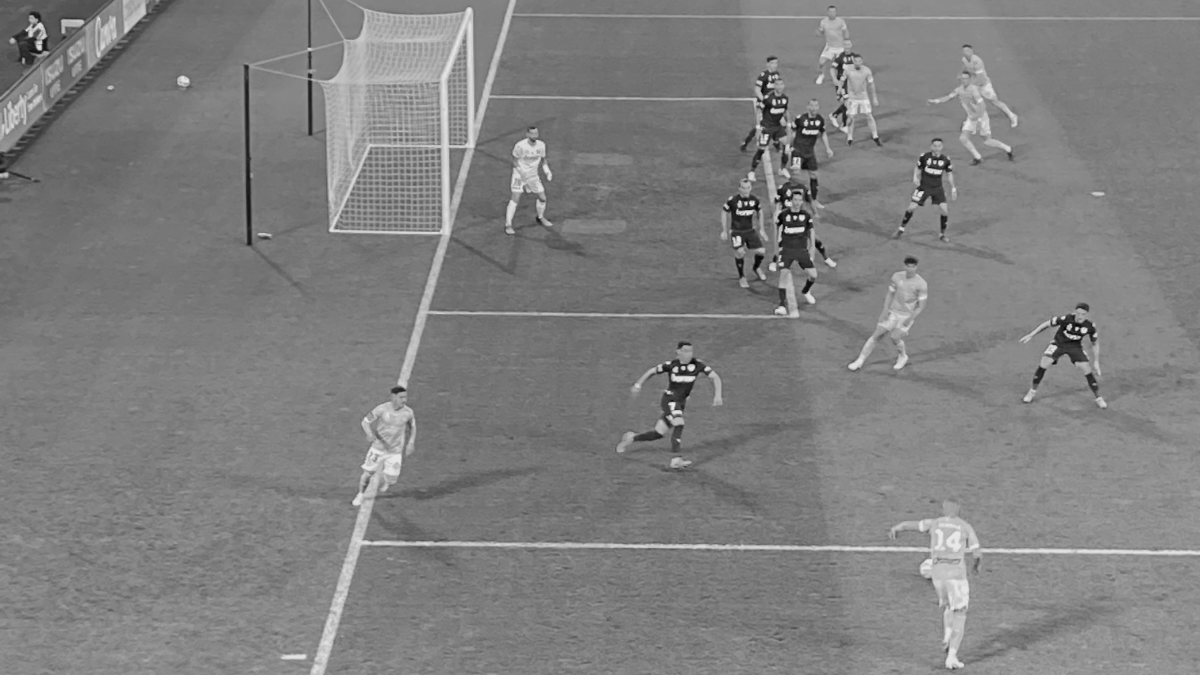
Despite the run of play, the home crowd was surprisingly raucous. However, I missed that one guy that you’ll find in any football stadium, the guy who loses his composure throughout the game, constantly commenting on everything happening on the pitch, convinced it wouldn’t happen if he’d played himself.
And yes, it’s “football,” not “soccer.” I’ll die on that hill.
A-League. AAMI Park, 22 October 2022 7:45. Attendance: 23,489. Goals: 0:1 Jamie Maclaren (17’), 0:2 Cadete (19’, OG). Red card: Joshua Brillante (35’).